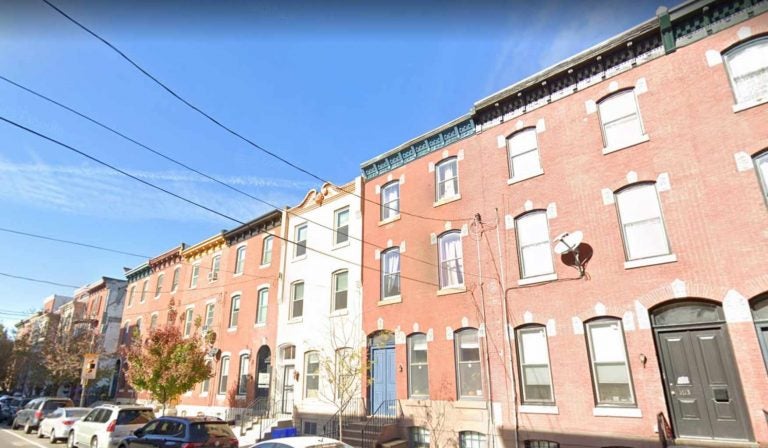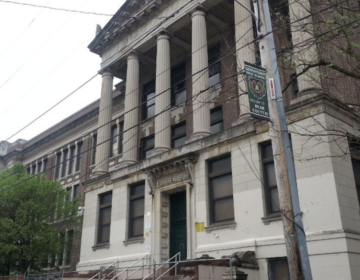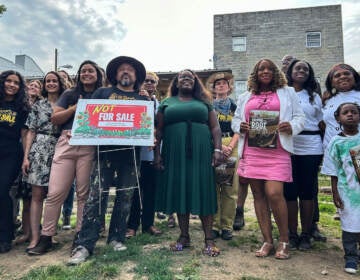City Council eyes demolition ban for ‘Doctors’ Row’ to preserve Black history in South Philly
Doctors’ Row in Graduate Hospital could become the city’s first historic district based on the legacy of Black Philadelphians.

The 1600 block of Christian Street, known as Black Doctors' Row. (Google Maps)
Philadelphia City Councilmember Kenyatta Johnson is proposing a one-year demolition moratorium for South Philly’s “Doctors’ Row,” a stretch of Christian Street settled in the 19th century by prominent Black Philadelphians such as famed architect Julian Abele and Rev. Charles Tindley.
But the temporary ban on teardowns is also a likely prelude to a permanent historic district, which preservationists say would be the city’s first based mainly on the history of Black Philadelphians.
The large rowhouses of Doctors’ Row run between Broad to 20th Street, a section of the city undergoing rapid change as developers snap up increasingly valuable real estate with visions of condos and luxury renovations.
Johnson described his proposal, introduced at a Thursday City Council session, as a reaction to these homes coming under increasing threat of demolition. Earlier this year, a developer began demolition of a home adjacent to Abele’s former residence. While the architect’s home is historically protected, most neighboring structures are not.
“Some of them have been slated for redevelopment so as a result, we began looking at the preservation of historic landmarks along Christian Street,” Johnson said in a hearing last week. “A significant amount of prominent African Americans have lived in that particular area throughout the ages.”
Vincent Thompson, a spokesperson for the councilmember, said civic organizations active in the area including South of South Neighborhood Association and the Preservation Alliance for Greater Philadelphia, support the legislation.
While the proposed legislation would bar total demolition, it would still allow for more minor alterations to existing homes or teardowns of imminently dangerous structures. The moratorium would only last one year and would expire upon the creation of a historic district in the area.
Preservation Alliance Executive Director Paul Steinke said that’s because the bill is meant to interlock with a parallel effort by his group to research and create the historic district encompassing the same area in the coming year.
“It’s on the verge of being proposed,” he said, of the historic district. “It’s a corridor that’s been under pretty intense development pressure and has seen some pretty high-profile demolitions.”
In Graduate Hospital, African Americans have declined as a share of the neighborhood population as the pace of development has increased and more affluent, often white residents moved into the area.
By 2018, the median household income in the neighborhood had risen to $91,445, unseating Chestnut Hill as the richest neighborhood in the city, according to census data. Historic institutions, particularly large churches, have meanwhile caught the eye of developers seeking opportunities to build in a ZIP code that ranks as one of the nation’s fastest gentrifying.

While preservationists have long blasted the city for its failure to nominate more structures to its historic registry, some say the problem is particularly acute when it comes to Black historical landmarks.
Steinke said none of the city’s current districts were primarily based upon the historic contributions of Black Philadelphians.
“We’re excited about creating a district that would recognize this area as the home to many prominent 19th century African American families,” he said.
 WHYY is one of over 20 news organizations producing Broke in Philly, a collaborative reporting project on solutions to poverty and the city’s push towards economic justice. Follow us at @BrokeInPhilly.
WHYY is one of over 20 news organizations producing Broke in Philly, a collaborative reporting project on solutions to poverty and the city’s push towards economic justice. Follow us at @BrokeInPhilly.

Subscribe to PlanPhilly
WHYY is your source for fact-based, in-depth journalism and information. As a nonprofit organization, we rely on financial support from readers like you. Please give today.









